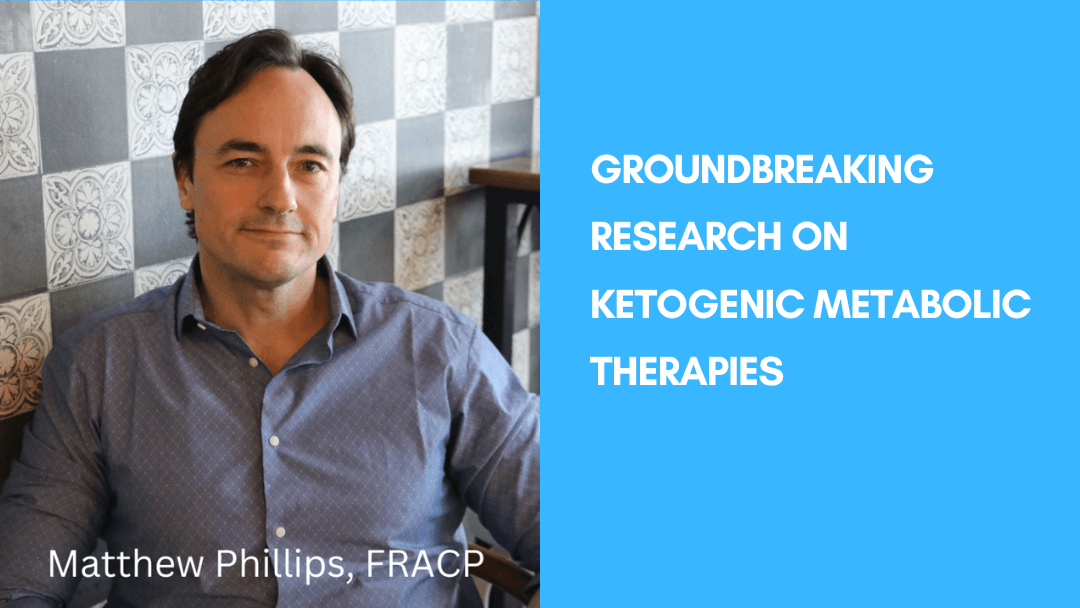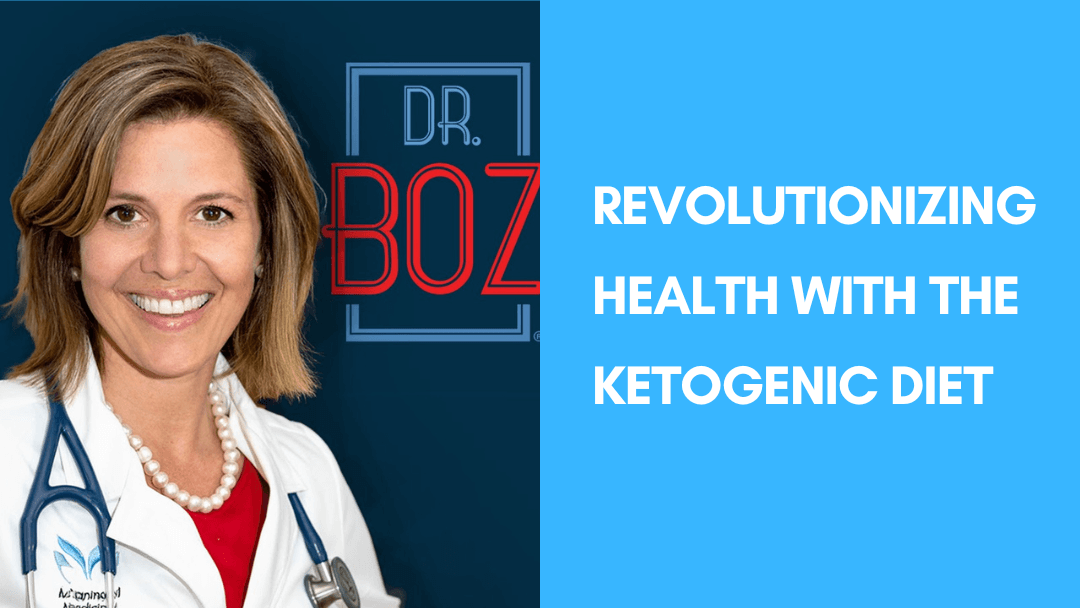In the dynamic field of ketogenic metabolic therapy, few have made as profound an impact as Dr. Matthew Phillips. Based at Waikato Hospital in Hamilton, New Zealand, Dr. Phillips is not just a clinical neurologist but a trailblazer in research, exploring the transformative potential of metabolic strategies. His pioneering work, particularly in the realm of neurological disorders, places him at the forefront of a revolution that extends far beyond the confines of specialized medical treatment.
Dr. Phillips' focus on creating alternate metabolic states through fasting and ketogenic diets is groundbreaking. His research team has conducted the world's first randomized studies on individuals diagnosed with Parkinson’s and Alzheimer’s, offering new hope and avenues of treatment. Currently, they are leading a pioneering clinical trial combining intensive fasting and a ketogenic diet with standard treatments for patients with glioblastoma, a particularly aggressive form of brain cancer.
I recently had the opportunity to speak with Dr. Phillips about his remarkable work, and through our conversation, it became clear that his insights hold profound implications not only for those battling severe neurological conditions but also for individuals grappling with everyday health challenges, including obesity, pre-diabetes and diabetes, and a wide range of other metabolic diseases. His work with the glioblastoma trial and with motor neuron diseases has shed light on the potential of rejuvenating damaged mitochondria. This focus offers hope not only for those with neurodegenerative disorders and cancer, but may also provide a key to unlocking broader health benefits for the general population.
“The mitochondria are often heavily impaired and damaged,” said Dr. Phillips. “So if we work on restoring and rejuvenating the mitochondria, we could actually provide a different way to help people with a lot of these disorders.”
The Transformative Potential of Ketogenic Metabolic Therapy
Dr. Phillips' extensive experience with ketogenic metabolic therapy (KMT) in treating neurological disorders such as Parkinson’s and Alzheimer’s, as well as glioblastoma patients offers profound insights into the potential of this diet for other health issues such as obesity, metabolic syndrome, and type 2 diabetes.
Dr. Phillips highlights the ketogenic diet's role beyond just another diet. “Don’t think of it as a diet; it’s a state,” he emphasizes, pointing to numerous studies that validate the diet's efficacy in reversing obesity and type 2 diabetes. This approach is not just about dietary changes; it's about a deeper understanding of the body's metabolic processes and utilizing them for both prevention and treatment in broader health contexts.
In treating his patients, Dr. Phillips has observed that the ketogenic diet routinely leads to numerous health and quality of life benefits. "We frequently wipe out any coincident pre diabetes, normalize the body-mass index, reduce or eliminate hypertension, and improve the cholesterol profile in our trial participants."
Dr. Phillips observes, "Based on preliminary findings, most people seem to genuinely enjoy life on metabolic therapy, although it is too early to make any definitive statements about whether they are living longer than they are supposed to in our glioblastoma trial." This testimony from his work with glioblastoma patients resonates with the potential benefits for those adopting a ketogenic diet in the broader population, highlighting enhanced life quality and longevity.
"Within a few weeks on our more intensive ketogenic protocol, we see that any pre-existing type 2 diabetes typically either drastically improves or is put into remission." This rapid improvement in diabetes markers among patients with severe neurological disorders underscores the diet's potential impact in the general population, particularly for those battling metabolic disorders.
A crucial aspect of Dr. Phillips' method is the empowerment given to patients. "Metabolic strategies are very self-empowering... you're doing it yourself." This sense of control, vital for patients with serious illnesses, is just as important for individuals aiming to improve their overall health. It offers a way for active involvement and significant transformation in their health journey.
Revisiting Our Evolutionary Diet
“I think if people understand that rather than looking at it as a diet, that it's a lot deeper than that, and it goes back to our evolution, then maybe some people can understand why this can be so tremendously helpful stopping the lifestyle disorders before they even appear, including type 2 diabetes.”
“Type 2 diabetes is unnatural. It didn't really exist to any great extent in our evolutionary past, even 100 years ago. It's almost solely induced by our dietary lifestyle. And it's really not a good thing. It's a slow death. It's a slow death because you are slowly weakening your body over time and becoming more and more unhealthy.”
These insights from Dr. Phillips illustrate the ketogenic diet's profound implications, far beyond its application in neurological disorders, potentially revolutionizing how we approach and manage common health issues today.
Image Source: https://yourfamilydoctors.com.au/chronic-disease-management/
Challenges of Adherence to the Ketogenic Diet
One of the most troubling aspects of most diets is the difficulty most people seem to have in adhering to them. Interestingly, Dr. Matthew Phillips points out that adherence to the ketogenic diet is very high among his glioblastoma patients. This contrasts sharply with individuals seeking weight loss or remission or management of type 2 diabetes. Dr. Phillips attributes this to the stark reality glioblastoma patients face, which significantly motivates them. “Death is staring them in the face,” he states, underscoring the high motivation levels of these patients compared to those dealing with type 2 diabetes, where the threat, although great, is not as immediate.
Dr. Phillips believes the key to adherence lies in mindset and framing. He suggests presenting the ketogenic diet and fasting as easy and natural, aligning with evolutionary practices. “I think if people understand that rather than looking at it as a diet, that it's a lot deeper than that, and it goes back to our evolution, then, then maybe some people can understand why this can be so tremendously helpful and stopping the lifestyle disorders before they even appear, including type 2 diabetes,” he explains.
Dr. Phillips himself follows a ketogenic Mediterranean diet and advocates for a similar approach for other health professionals who want to help their patients undergo a dietary lifestyle change. “I think not being hypocritical and actually doing it is really helpful when working with people,” he adds, sharing his own dietary practices, including one meal a day and regular prolonged fasting.
Insights on Belief and Open-Mindedness
Dr. Phillips' insights provide a comprehensive guide on the importance of belief, the power of open-mindedness, and the necessity of internal motivation in achieving success. He emphasizes the profound impact of our beliefs on our perceptions and realities. “We perceive what we believe,” he begins, highlighting the power of mindset.
Discussing human psychology, Dr. Phillips notes the importance of overcoming negative or incorrect beliefs. His approach to change is grounded in empathy and patience, valuing engagement with opposing views. “I particularly enjoy speaking to my neurology colleagues... They're very skeptical, intelligent people. So if I can field their questions, then I'm happy,” he says, underlining his commitment to learning from a variety of viewpoints.
Addressing dietary debates, Dr. Phillips observes, "It seems to me that the vegetarian-carnivore debate detracts from the main issue of being in a ketogenic state, as both diets can produce this. That being said, I know a number of ex-vegans who are now carnivore. I don't know of any ex-carnivores that are vegan." This, he believes, is due to the naturally ketogenic aspect of a properly conducted carnivore diet and its evolutionary alignment for many people. He suggests that adverse health outcomes experienced by some vegans might prompt them to explore alternative dietary approaches.
The Crucial Role of Ketone Monitoring in Metabolic Therapy
Dr. Phillips spoke about the importance of the measurement of ketones, a critical aspect of metabolic therapy, especially in the context of ketogenic diets. Dr. Phillips provided several key insights:
-
The Significance of Ketone Measurement in Clinical Trials: Dr. Phillips highlighted the essential role of ketone measurement in his clinical trials, particularly for glioblastoma patients. “We currently use the finger prick. Once a day they check the glucose and they check ketones,” he explained. This routine is a cornerstone in understanding the patient's adherence to the dietary protocol.
-
Ketones as Markers, Not Therapeutic Agents: Contrary to some beliefs, Dr. Phillips emphasizes that the value of ketones lies not in their direct therapeutic effects but as indicators of proper dietary adherence. “The power of the ketone is not the ketone itself. The ketone is a marker that you're doing everything else right,” he states. This perspective shifts the focus from the ketone levels themselves to the overall dietary and metabolic process.
-
Continuous Monitoring and its Advantages: Discussing the potential benefits of continuous ketone and glucose monitors, Dr. Phillips noted “A very useful aspect of continuous monitoring is to see how many spikes I get throughout the day. It's really important not to just look at the glucose level, but also at the shape of the curve.” This approach allows for a more nuanced understanding of an individual's metabolic state throughout the day.
-
The Application of Continuous Ketone Monitoring (CKM) in the General Population: Addressing the broader implications, Dr. Phillips sees a distinct advantage in using continuous ketone monitors for the general population, especially those at risk for conditions like type 2 diabetes or obesity. “Definitely, there's an advantage. It’s information,” he asserts, underscoring the value of having more data to make informed health decisions.
-
Exploring CKM in Personal Use: Although Dr. Phillips hasn't yet used continuous ketone monitors, he expresses interest in exploring their potential. “I think it would be useful,” he remarks, considering the possibility of gaining deeper insights into daily ketone fluctuations and their implications for health and disease management.
Dr. Phillips' insights on ketone monitoring reinforce the idea that understanding and managing metabolic health goes beyond simple dietary changes. It involves a comprehensive approach where monitoring and data play a crucial role, offering a window into the body's metabolic processes and the effectiveness of therapeutic interventions.
Embracing Feedback in Health Management
Dr. Phillips advocates a transformative approach to health management, emphasizing the power of feedback over mere accountability. "It's more about feedback from a metabolic therapy program, rather than being accountable to it," he said. “If someone is viewing it as accountability, then I've already failed," he asserts. This philosophy underscores his commitment to fostering a deeper understanding and intrinsic motivation for healthful practices, rather than relying on external accountability measures.
Central to this approach is a psychological shift in perspective. Dr. Phillips believes that success in health management hinges on individuals' ability to see their health choices not as burdensome obligations, but as positive lifestyle changes.
In discussing the role of CKM, Dr. Phillips emphasizes its function as a tool for gaining insight, rather than a mechanism for self-discipline. "If you're doing this and embracing it... then it's more about information," he explains. This viewpoint reframes the use of monitoring technologies as a means to empower individuals with knowledge about their health, enabling them to make informed decisions based on their body’s responses.
Dr. Phillips' experience with patients undergoing intensive treatments like chemotherapy and radiation reveals a noteworthy trend: a sustained commitment to a fasting keto lifestyle after the conclusion of their chemotherapy and radiation treatments. "Almost every single person continues with their fasting keto lifestyle," he observes. This consistency among patients illustrates the effectiveness of a feedback-oriented approach. It shows how patients, armed with the right information and mindset, can adeptly navigate their health journey—adapting to new environments, modifying their diet to fit their needs, and making choices that align with their health goals.









